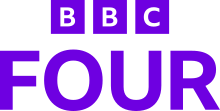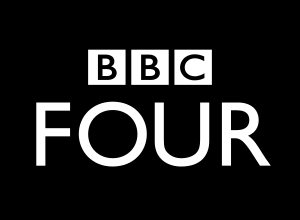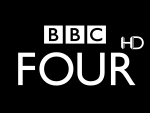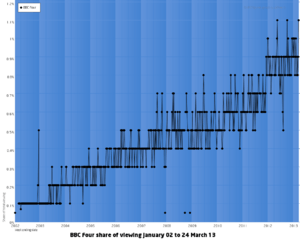BBC Four facts for kids

Logo used since 2021
|
|
| Country | United Kingdom |
|---|---|
| Broadcast area | United Kingdom Guernsey Isle of Man Jersey |
| Network | BBC Television |
| Headquarters | London, England |
| Programming | |
| Language(s) | English |
| Picture format | 1080i/1080p HDTV (downscaled to 576i for the SDTV feed) |
| Ownership | |
| Owner | BBC |
| Sister channels | BBC One BBC Two BBC Three BBC News BBC Parliament CBBC CBeebies BBC Scotland BBC Alba |
| History | |
| Launched | 2 March 2002 |
| Replaced | BBC Knowledge |
| Availability | |
| Terrestrial | |
| Freeview (UK) | Channel 9 (SD; 24 in Scot) Channel 106 (HD) |
| Streaming media | |
| BBC iPlayer | Watch live (UK only) |
| Virgin TV Anywhere | Watch live (Ireland only) |
BBC Four is a TV channel from the BBC in the United Kingdom. It's free to watch and started on 2 March 2002. This channel shows lots of different programmes. You can find shows about arts, interesting documentaries, music, films from other countries, and dramas. It also covers current events.
BBC Four has special rules about what it must show. For example, it needs to air at least 100 hours of new arts and music shows each year. It also has to show 110 hours of new factual programmes. Plus, it premieres twenty foreign films every year. The channel broadcasts every day from 7:00 pm until 4:00 am. It shares its broadcast time with CBeebies, a channel for younger children.
Contents
How BBC Four Started
BBC Four began broadcasting on 2 March 2002 at 7:00 pm. It was originally planned to launch in 2001, but there was a small delay. Before becoming its own channel, BBC Four was a late-night schedule block on BBC Two. It then got its own channel, just like BBC Three.
BBC Four took the place of BBC Knowledge. That was an educational and cultural channel that had changed a lot over time. In its last form, BBC Knowledge showed documentaries and art programmes. This was like a test run for what BBC Four would later become. The BBC rebranded it to fit with BBC One and BBC Two.
The BBC had been planning these new channels since October 2000. However, the government took some time to approve the plans for new BBC digital channels. The BBC Four plans were approved earlier, so it launched before BBC Three.
What Makes BBC Four Different?
BBC Four was different from the old BBC Knowledge in a few ways. It would be promoted more, with lots of new and original shows. Also, it wouldn't broadcast 24 hours a day.
This is because on Freeview, a digital TV platform, BBC Four shares its broadcast time with CBeebies. CBeebies is on air from 6:00 am until 7:00 pm. So, BBC Four broadcasts from 7:00 pm to about 4:00 am every night. There's a short break before CBeebies starts its schedule again.
BBC Four in Other Countries
On 12 May 2011, BBC Four became available on Sky TV in the Republic of Ireland. It moved to different channel numbers over time. This helped make space for new channels and put it next to other BBC channels.
Special AI Programming
On 17 August 2018, BBC Four tried something new called BBC 4.1. This was a special two-night event where artificial intelligence (AI) chose the programmes. The AI picked shows based on what BBC Four viewers usually liked. It looked at past schedules and programme types. Then, it ranked the shows it thought were most relevant.
These special programmes aired on 4 and 5 September 2018. They included shows about AI itself. For example, "Made by Machine: When AI Met The Archive" explained how the AI worked. "The Joy of AI" talked about how machine learning started and why we shouldn't be scared of it.
Changes to Channel Numbers
In February 2019, Virgin Media stopped showing BBC Four in standard definition.
When BBC Scotland launched on 24 February 2019, BBC Four's channel number on Freeview changed in Scotland. It moved to a higher number to make room for the new BBC Scotland channel. Over time, it moved to different numbers, eventually settling on channel 24 in Scotland.
Future Plans for BBC Four
In May 2020, the BBC suggested some changes for BBC Four. They thought about making BBC Two the main channel for specialist programmes. Under this idea, BBC Four would stop making new shows. Instead, it would become a service that shows programmes from the BBC's "rich archive" (old shows). The BBC also thought about making BBC Four a global brand. This would help share its strong factual programmes with the world.
On 26 May 2022, the BBC announced plans to stop broadcasting BBC Four as a regular TV channel. This was part of a plan to focus more on digital services. However, in March 2023, reports said the BBC might change its mind. This was because BBC Four still had many viewers and was cheap to run. Also, the relaunch of BBC Three as a linear channel hadn't been as successful as hoped. BBC Four's budget had been cut, but it still reached more viewers than BBC Three.
Who Runs BBC Four?
The direction of BBC Four is guided by its purpose, which is set by the BBC's governing body, the BBC Board. The channel used to have a "Controller" who was in charge.
In October 2013, the way the channel was managed changed. The role of Controller of BBC Four was removed. Instead, the Controller of BBC Two also became responsible for BBC Four. A new "Channel Editor" role was created to handle the day-to-day running of BBC Four.
Here are some of the people who have been in charge of BBC Four:
- 2002–2004: Roly Keating
- 2004–2008: Janice Hadlow
- 2008–2013: Richard Klein
- 2013–2014: Janice Hadlow (as Controller of BBC Two and BBC Four)
- Early 2014: Adam Barker (interim Controller of BBC Two and BBC Four)
- 2014–2016: Kim Shillinglaw (as Controller of BBC Two and BBC Four)
The Channel Editor of BBC Four since 2013 has been Cassian Harrison.
BBC Four HD
On 16 July 2013, the BBC said that a high-definition (HD) version of BBC Four would launch. This HD channel started on 10 December 2013. It became available across the country by June 2014.
BBC Four HD shares its broadcast stream with CBeebies HD. This is because they broadcast at different times of the day. Before this, most of BBC Four's HD shows were on the BBC HD channel. In 2017, BBC Four HD also launched in Ireland.
What Programmes Does BBC Four Show?
BBC Four's main job is to show a variety of UK and international arts, music, and culture. It should offer exciting, high-quality programmes that make you think and learn. It takes a deep and expert look at many different topics.
The very first programmes on BBC Four were also shown on BBC Two. The first show was The Man Who Destroyed Everything. This was a documentary about an artist named Michael Landy.
BBC Four became known for showing popular series like Curb Your Enthusiasm and The Thick of It. It also introduced UK viewers to international dramas like the Danish thriller The Killing.
The channel broadcasts many different types of shows. These include art and science documentaries. It also shows older dramas, including many rare black-and-white programmes. You can also find films and TV shows from other countries, like the French thriller Spiral and the Swedish detective series Wallander. BBC Four also supports foreign-language films with its yearly BBC Four World Cinema Awards.
Until mid-2020, BBC Four used to broadcast a global news bulletin on weekdays at 7:00 pm. This was usually a simulcast of Beyond 100 Days. As of autumn 2020, BBC Four no longer broadcasts a news bulletin.
The channel also screens many documentaries. These include The Century of the Self and The Trials of Henry Kissinger. It's also home to political travel shows like Holidays in the Axis of Evil. These shows often feature investigative journalism.
Drama programmes have been very popular on the channel. Shows like The Alan Clark Diaries (2003) and Kenneth Williams: Fantabulosa! (2006) had many viewers. Hattie in 2011 set a record for BBC Four's highest ratings. Another popular show was The Curse of Steptoe.
A notable programme on BBC Four is Charlie Brooker's Screenwipe. This show reviews current TV programmes. It also shares stories and comments on how television is made. The show is presented by Charlie Brooker.
BBC Four also helps with the BBC Archive project. This project aims to re-broadcast old BBC TV shows. The goal is for people to enjoy these older programmes again.
Some programmes from BBC Four were sometimes repeated on BBC Two. This was called 'BBC Four on Two'. However, this usually happened late at night and has now stopped.
According to BARB, a company that measures TV audiences, the comedy panel game QI has the highest ratings of any show on BBC Four.
At the Edinburgh International Television Festival, BBC Four won the "Non-Terrestrial Channel of the Year" award in 2004, 2006, and 2012.
In 2012, Dirk Gently became the first ongoing drama series made for the channel.
When BBC Three was not a regular TV channel, BBC Four sometimes showed live sports. For example, it aired games from the UEFA Euro 2016 and 2018 FIFA World Cup football tournaments. It also showed England women's football matches. The channel even extended its broadcast hours to show live action from the 2016 Summer Olympics.
As of 2023, BBC Four still features music programmes on Friday nights. These include Top of the Pops and documentaries by Neil Brand. On Saturdays, it often shows imported dramas. The early evening weekday slot at 7 pm often features "archive" programmes. These include shows by Bob Ross and Fred Dibnah. This slot also gives regional programmes a chance to be seen nationally.
On 9 April 2021, BBC Four stopped broadcasting temporarily due to the death of Prince Philip, Duke of Edinburgh. This was done to save bandwidth for news coverage on BBC One and Two. The same thing happened after the death of Elizabeth II on 8 September 2022.
Popular Programmes on BBC Four
Here are some of the original programmes made for BBC Four:
- The Art of Cornwall
- The Ballad of Mott the Hoople
- BBC Four News
- BBC Four Sessions
- Birds Britania
- Britain by Bike
- Britain's Best Drives
- Can Eating Insects Save the World
- Charlie Brooker's Screenwipe
- Children's TV Trials
- Churches: How To Read Them
- The Curse of Steptoe
- Detectorists
- Dinosaurs, Myths and Monsters
- Dirk Gently
- Elegance and Decadence: The Age of the Regency
- The First World War
- Frankenstein: Birth of a Monster
- Free Will and Testament: The Robert Wyatt Story
- Goodbye BBC Television Centre
- The Great War
- Hattie
- H. G. Wells: War with the World
- Hinterland/Y Gwyll (Joint BBC / S4C production, English-language version)
- Hive Minds
- How to Build a Dinosaur
- If Walls Could Talk
- Jerusalem: The Making of a Holy City
- Music for Misfits: The Story of Indie
- Only Connect
- Racing at the BBC
- Sandhurst
- The Secret Life of Ice
- Shock and Awe: The Life of Electricity
- Singer-Songwriters at the BBC
- Sings the...
- The Life of Rock with Brian Pern
- The Story of Musicals
- The Story of the National Grid
- Survivors: Nature's Indestructible Creatures
- Talking Children
- Timeshift
- Twenty Twelve
- To Kill a Mockingbird at 50
- Walter's War
- We Need Answers
- World News Today (simulcast on BBC Four and BBC World News, previously World News Today with Zeinab Badawi)
- Beyond 100 Days (simulcast on BBC Four, BBC News and BBC World News; Previously 100 Days (January – April 2017), 100 Days + (May – July 2017)
- A Very British History
Here are some popular shows from other countries that BBC Four has shown:
- Arne Dahl
- The Bridge
- Borgen
- Hostages
- Inspector De Luca
- Inspector Montalbano
- The Killing
- Minuscule
- The Money
- Salamander
- Spiral
- Trapped
- Wallander
- The Joy of Painting
BBC Four also repeats many classic British shows:
- Africa
- All Creatures Great and Small
- Batman
- The Bear Family and Me
- Blue Peter (Classics only)
- The Blue Planet
- Butterflies
- Casualty 1906
- Casualty 1907
- Climbing Great Buildings
- Cranford
- Doctor Who (1963–89)
- Ever Decreasing Circles
- Fawlty Towers
- The Frozen Planet
- The Good Life
- Great British Railway Journeys
- I, Claudius
- Juliet Bravo
- Last of the Summer Wine
- Life
- The Life and Loves of a She-Devil
- The Life of Mammals
- The Likely Lads
- Monty Python's Flying Circus
- The Onedin Line
- Outnumbered
- Peaky Blinders (Series 1-4, 6)
- Planet Earth
- Porridge
- Pride and Prejudice
- The Sky at Night
- Sorry!
- Supernatural
- Sykes
- The Good Old Days
- The Two Ronnies Sketchbook
- Waking the Dead
- Walking with Beasts
- Walking with Dinosaurs
- Whatever Happened to the Likely Lads?
- Yes Minister
- Yes, Prime Minister
- The Young Ones
BBC Four also broadcasts many music concerts and music programmes:
- BBC Radio 1's Big Weekend (from 2016)
- Coldplay Live
- David Gilmour Live in Gdansk (part of David Gilmour Night)
- Eurovision Song Contest semi-finals (2016–2021)
- Madness Live (part of Goodbye Television Centre)
- Queen 1975 Live
- ...at the BBC (music compilations)
- The Sound of Musicals with Neil Brand (documentary series)
- The Sound of TV with Neil Brand (documentary series)
- Top of the Pops (repeated episodes)
- Top of the Pops: The Story of... (documentary series)
- Top of the Pops: Big Hits (compilation series)
- Top of the Pops: Big Hits 1964 to 1975 (longer compilation)
Some classic shows shown in 2007 and 2015 include:
Most Watched Programmes on BBC Four
Here are the ten most watched programmes on BBC Four since it started. These numbers are based on data from BARB, which tracks TV viewing. They do not include repeats.
| Rank | Programme | Number of Viewers | Date |
|---|---|---|---|
| 1 | The Jeremy Thorpe Scandal | 2,378,000 | 3 June 2018 |
| 2 | Hattie | 2,005,000 | 19 January 2009 |
| 3 | The Bridge | 1,810,000 | 21 November 2015 |
| 4 | Snooker: 2020 World Championship | 1,738,500 | 14 August 2020 |
| 5 | Detectorists | 1,687,000 | 8 November 2017 |
| 6 | Roots | 1,659,000 | 8 February 2017 |
| 7 | The Curse of Steptoe | 1,625,000 | 19 March 2008 |
| 8 | The Bridge | 1,620,000 | 1 February 2014 |
| 9 | Detectorists | 1,593,000 | 22 November 2017 |
| 10 | Goodbye Television Centre | 1,588,000 | 22 March 2013 |
BBC Four Outside the UK
BBC Four is also available in some other countries. You can watch it on cable, IPTV, and digital satellite TV in places like the Republic of Ireland, the Netherlands, Belgium, Switzerland, and Liechtenstein.
How BBC Four Looks and Sounds
When the channel first started, its idents (short videos shown between programmes) were very unique. They changed based on the sound of the announcer's voice or the background music. This meant no two idents were ever exactly the same! The first voice you would hear was Zeb Soanes.
The channel's first slogan was "Everybody Needs A Place To Think." The BBC stopped using this slogan a few months after the launch. However, you can still find the BBC Four logo and this slogan engraved on benches along the South Bank in London.
In September 2005, BBC Four started using new idents. These showed the BBC Four logo in the middle. Around it were four sections showing different parts of the same video. This created a cool optical illusion. For example, you might see a swimming pool where a person appears in one corner, but the ripples don't spread to the other sections. It looked like one image at the start, but by the end, you could clearly see four separate images.
In March 2019, BBC Four added more new idents. These were inspired by "oddly satisfying videos" and continued the theme of the four sections. They first appeared during a special set of programmes celebrating the 30th anniversary of the World Wide Web.
Images for kids
See also
 In Spanish: BBC Four para niños
In Spanish: BBC Four para niños
 | Emma Amos |
 | Edward Mitchell Bannister |
 | Larry D. Alexander |
 | Ernie Barnes |







